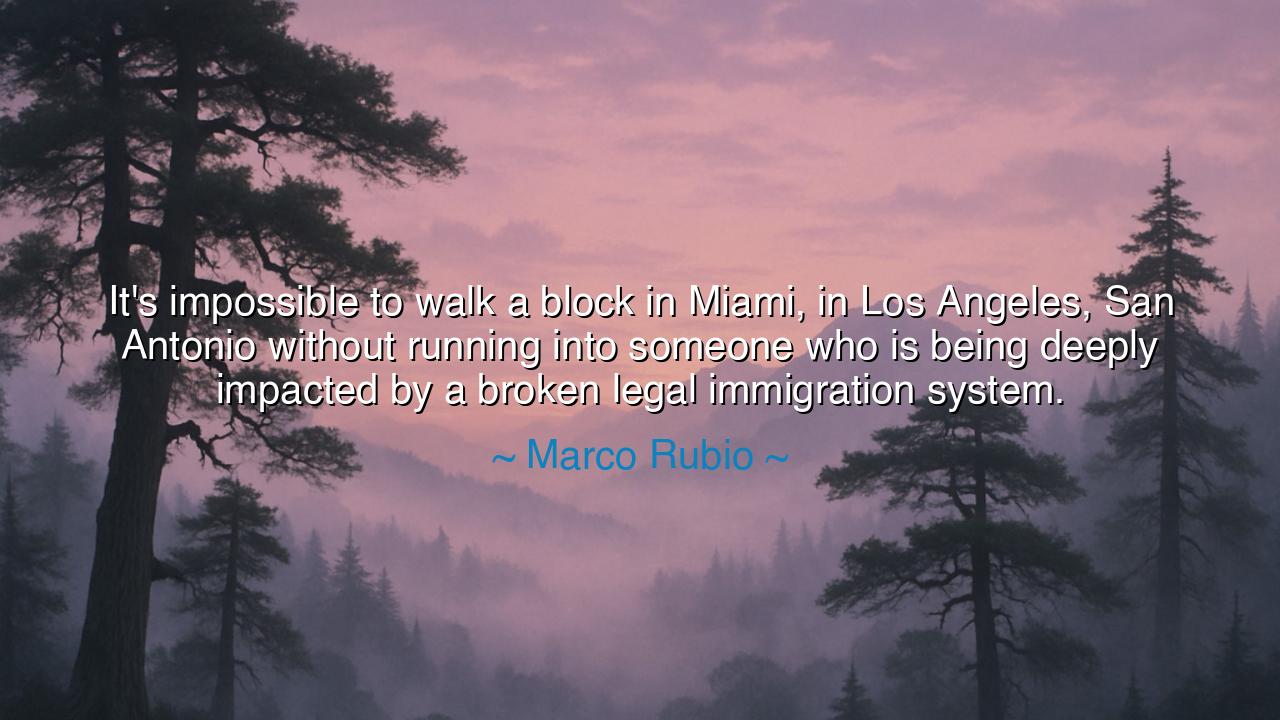
It's impossible to walk a block in Miami, in Los Angeles, San
It's impossible to walk a block in Miami, in Los Angeles, San Antonio without running into someone who is being deeply impacted by a broken legal immigration system.






Hear the voice of Marco Rubio, himself the son of immigrants, who declared with sorrow and urgency: “It’s impossible to walk a block in Miami, in Los Angeles, San Antonio without running into someone who is being deeply impacted by a broken legal immigration system.” These words are not idle sentiment, but a cry rising from the heart of cities and communities where the struggles of immigrants are not distant tales, but daily realities etched into the faces of neighbors, workers, and families. He reminds us that the wounds of a flawed system are not hidden—they live among us, visible in every street, undeniable in every block.
When Rubio speaks of Miami, Los Angeles, San Antonio, he names cities that are crossroads of cultures, homes to millions whose stories are bound to migration. In these places, the blessings and burdens of immigration are lived most vividly. Miami bears the legacy of Cuban exiles, Los Angeles the tapestry of Mexico, Central America, and Asia, and San Antonio the centuries-old ties of the borderlands. Yet beneath their vibrancy lies pain—families divided by paperwork and policy, workers trapped in uncertainty, children growing in fear that parents may be taken from them. These cities are symbols, but they are also testimonies.
The phrase “deeply impacted” is no exaggeration. To live under a broken immigration system is to carry burdens that touch every part of life. It may mean working without security, unable to plan for tomorrow. It may mean watching opportunity slip away because papers cannot be obtained. It may mean carrying the constant fear of separation, or enduring years of waiting in endless bureaucratic lines. Rubio’s words acknowledge this deep wound, which scars not only immigrants but the nation itself, for when one part suffers, all are diminished.
History offers us a reflection in the story of the Chinese Exclusion Act of 1882, when laws were passed to bar Chinese immigrants from entering or becoming citizens. Families were separated, workers were trapped in poverty, and communities endured suspicion and violence. The system was rigid and cruel, and it bore bitter fruit for decades. Yet even then, Chinese Americans endured, contributed, and fought for their dignity. Their struggle teaches us that broken laws do not erase human resilience—but they leave scars that take generations to heal. Rubio’s words echo that same warning for today.
The deeper meaning of his statement is that immigration is not an abstraction but a human reality. Policies debated in distant chambers take flesh in the lives of people encountered in markets, schools, and workplaces. A broken system is not simply inefficient; it breaks hearts, dreams, and families. Rubio calls us to remember that these are not faceless strangers but fellow travelers, carrying burdens we cannot ignore if we would claim to be a just society.
This teaching is both heroic and motivational. Heroic, because it demands that we face the truth rather than look away, acknowledging the flaws of a system that has long failed both immigrants and citizens alike. Motivational, because it calls on us to imagine and to build something better—a system that is orderly but compassionate, firm but fair, one that recognizes both the sovereignty of a nation and the dignity of every soul who seeks to live within its borders.
Children of tomorrow, let this wisdom be carved into your hearts: when you meet the stranger in your land, do not see only a problem of law, but a human being with hopes like your own. Do not let broken systems harden your hearts or blind your eyes. Instead, seek to heal where the law fails, to show kindness where bureaucracy falters, and to demand leaders who will build systems worthy of the people they govern.
Thus, the wisdom of Rubio’s words endures: that a broken legal immigration system is not a hidden wound, but one visible on every street of America’s great cities. It is not a distant issue, but a neighbor’s sorrow, a child’s fear, a family’s struggle. Let this truth stir you to compassion and action, so that one day, when you walk a block in Miami, Los Angeles, or San Antonio, you will see not the pain of brokenness, but the strength of a system healed and a people united.






AAdministratorAdministrator
Welcome, honored guests. Please leave a comment, we will respond soon